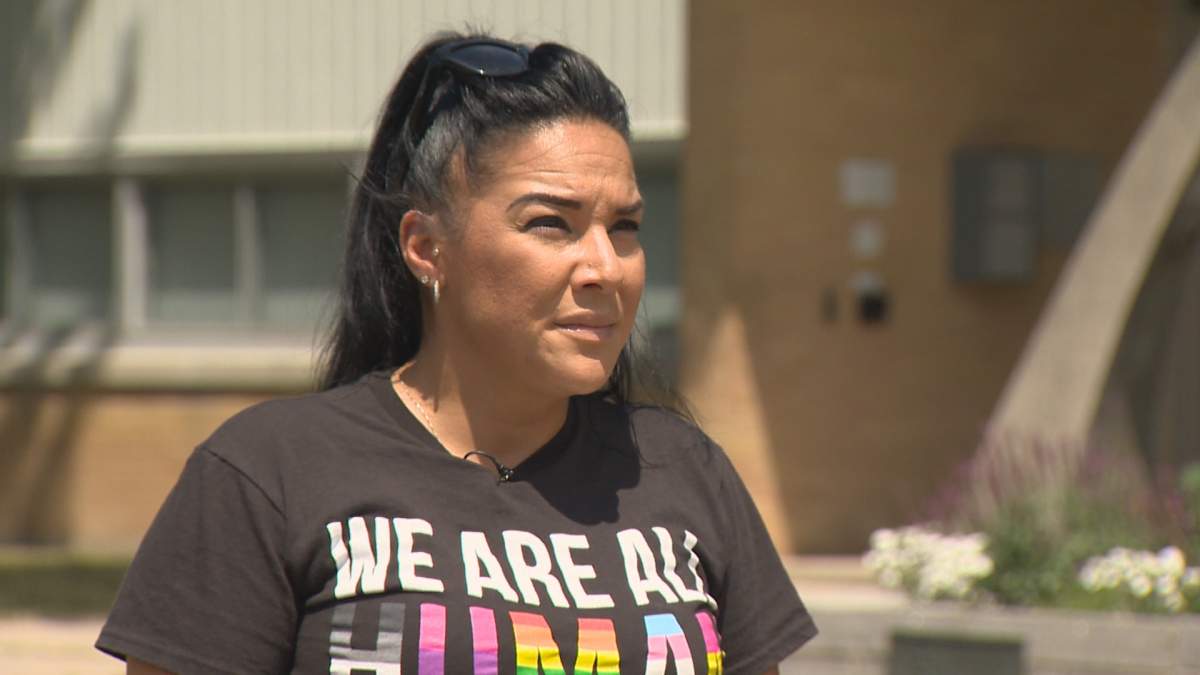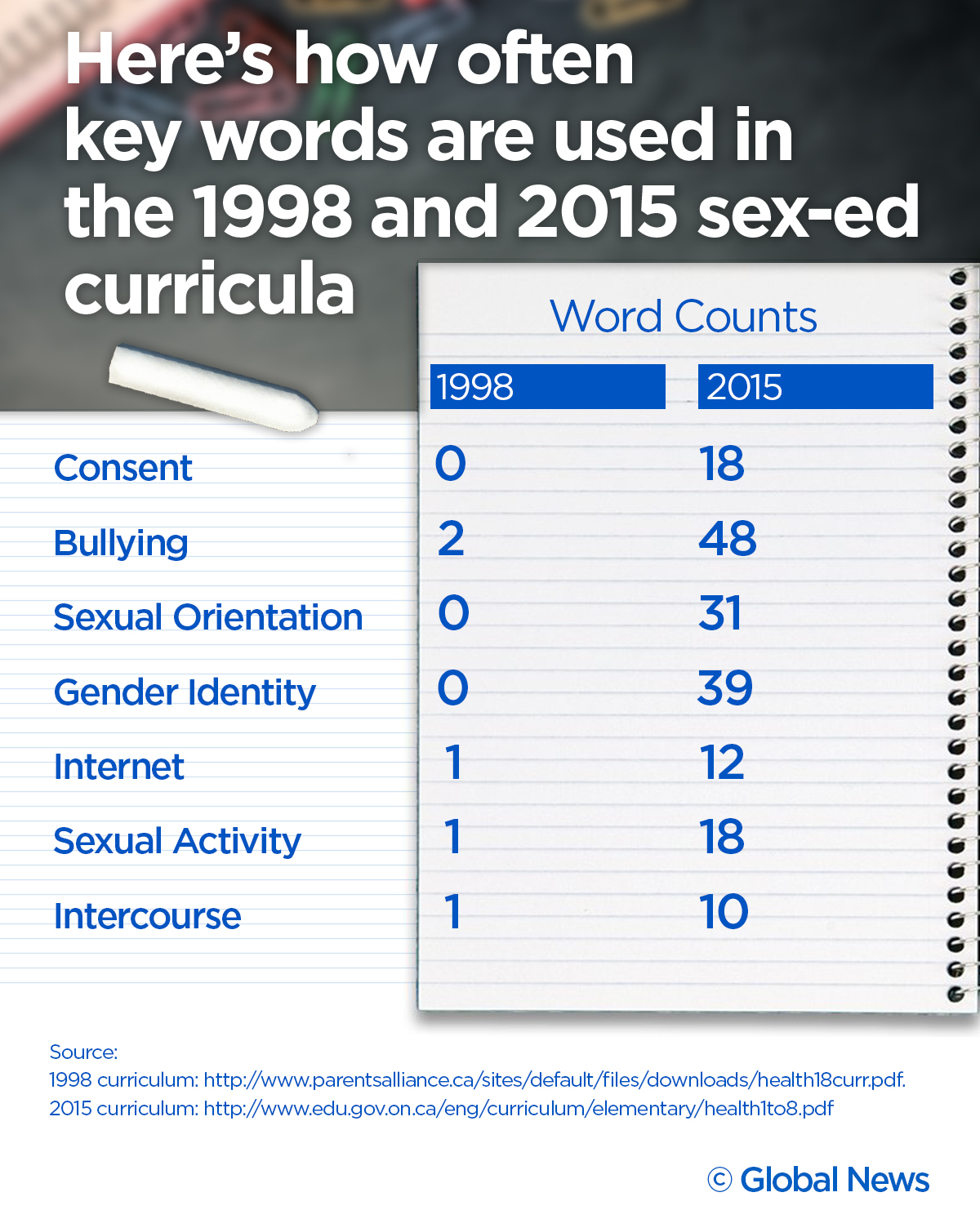When students return to Yeliz Sherifali’s health class in September, they will continue to learn about topics like same-sex relationships, sexual consent and gender identity, despite the Ontario government’s decision to return to the sex-education curriculum from the 1990s.

“You never expect people to move backwards in time,” Sherifali told Global News. “We need to provide our students with a toolbox of strategies that they can use the best way they see possible to make positive choices in their lives as adolescents.”
The Grade 7 and 8 health teacher with the Waterloo Region District School Board is among scores of educators left outraged this week after Doug Ford’s PCs announced they were scrapping the 2015 update to the province’s sex-ed curriculum brought in under the former Liberal government.
The new Education Minister, Lisa Thompson, announced Wednesday that schools in the fall would go back to teaching the 1998 curriculum, which predates same-sex marriage in Canada by seven years, and doesn’t include topics like cyber-bullying, social media or LGTBQ issues.
Thompson said the ministry is aiming to launch consultations for a new curriculum that could be introduced in the 2019-20 school year.
READ MORE: Doug Ford reverting Ontario back to 1998 sex-ed curriculum is ‘dangerous’ for kids, experts say

While Sherifali says she is legally required to teach what is mandated by the Ministry of Education, she will offer students a classroom that embraces diversity and offer modernized lesson plans on topics like the dangers of sexting, cyber-bullying and sexual violence.
“I won’t deny my students the opportunity to maximize their learning in the most authentic ways possible, by including language around LGTBQ+ communities and by using language and practices that respect Indigenous peoples,” she said.
Rebecca Dileo, who teaches visual arts Grades 9-12 in the Toronto District School Board, said she is infuriated but not surprised by the move from the Ford government, calling it an obvious play to please his socially conservative supporters.

Get daily National news
“Taking 20 steps is out of the question and an embarrassment for the province,” Dileo told Global News. “If I was teaching middle school, I would still be having the conversations you have to have in 2018.”
While Dileo won’t be directly affected by the changes, she said the conversations around sexuality, gender identity and social media need to begin with students at a young age.
Kids are talking about it
Teaching sexuality in the classroom in earlier grades helps to limit the misinformation that children may hear in the schoolyard or online, she said.
“Children are talking about sex. It’s happened throughout the years and will continue to happen,” Dileo said. “Going back in time doesn’t make sense.”
Global News reached out to Minister Thompson for comment but has not yet received a response.
Sam Hammond, president of the Elementary Teachers Federation, said the union is “deeply concerned” by the changes and will support teachers who chose to implement lesson plans that go beyond the old curriculum.
“Teachers have a professional duty to deliver the curriculum provided by the Ontario Ministry of Education,” Hammond said in an statement. “Teachers may use their professional judgement on how to deliver the approved curriculum and what things they may explore with students above and beyond that.”
WATCH: Mother fears transgender son’s identity won’t be ‘accepted’ after changes to curriculum

Speaking at an event in Toronto on Friday, NDP Leader Andrea Horwath said repealing a modernized curriculum will only put students at risk.
“To state the obvious, Doug Ford is absolutely wrong to rip up the health and physical education curriculum and drag Ontario back to the 1990s,” Horwath said. “A race back in time will only put students at risk and deny young people the supports, the dignity, the equality that they deserve.”
WATCH: Curriculum repeal will ‘drag Ontario back into another century,’ says Horwath

However, some parents and faith-based groups had staunchly opposed the updated curriculum over subject matter like same-sex relationships, gender identity and masturbation. The Thorncliffe Parents Association praised the PCs “for listening to parents’ voices and officially repealing the controversial curriculum.”
“It was basically a test of good and bad,” the association said in a Facebook post. “We are proud of ourselves to be a part of this movement that was run by common parents.” Experts who spoke with Global News say while parents can teach their kids sex-ed, it doesn’t mean it will happen.
1998 vs. 2018
Vanessa Oliver, an associate professor of Youth and Children’s Studies at Laurier, said she hopes that teachers across the province continue to teach elements of the curriculum introduced in 2015.
“I know that it is really important to teachers,” Oliver said. “There are some who are really passionate about it and think of it more as a human-rights issue and I think will do their best to try and keep teaching it.”
READ MORE: Parents can teach their own kids sex-ed — but that doesn’t mean they will
Students are increasingly navigating their sexuality and sexual health through technology, says Oliver, and the modernized curriculum helps students do just that.
“Because of a lot of misinformation that was passed around, some parents and maybe some politicians, are under the impression it’s a how-to manual. It’s of course, not that,” Oliver said. “In 1998 we barely even had Google, let alone Instagram, Snapchat, Grindr, Tinder, and Bumble.”
“Kids are living in a different whole world now and we need to support them by keeping up with them.”
The 2015 health and physical education curriculum, at 244-pages long, was developed after almost a decade of consultations with 4,000 parents and educators. The 1998 health and physical-ed curriculum is 42 pages and makes no mention of a specific sexual act, mention of male or female genitalia, or reference to sexual orientation or gender identity.
Here is a by-the-numbers comparison of how often key words appear in the two documents.









Comments